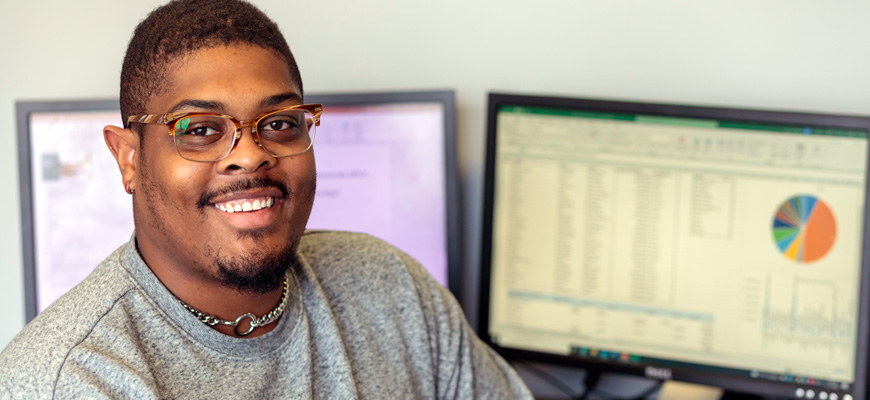
Fluor support creates diverse pipeline for engineering, business
Posted on: June 14, 2022; Updated on: June 14, 2022
By Page Ivey, pivey@mailbox.sc.edu, 803-777-3085
Brenden Chavis wants to follow in his father’s career footsteps, but he wants to do it on his own.
Chavis, an informatics Ph.D. student in the College of Engineering and Computing, says part of his interest in the field — which he describes as using existing technology to create new technology — came from his father and part just from his own curiosity.
“My father is in the technology field, and I've always really admired him and the work that he does,” Chavis says. “He definitely was one of my influences when I was picking what I wanted to do with my life. But I always was drawn towards technology — computers. I was always the kid waiting in line for the next new thing to come out.”
With a bachelor’s in information systems from Mount St. Mary’s University in Maryland and a master’s in data analytics from North Carolina A&T, Chavis is working his way through UofSC doctoral informatics program and plans to graduate in December 2023.
One of Chavis’ goals is to fund his education on his own and, thanks to programs funded by Fluor Corp., he is doing just that.
Chavis has funding and internships from Fluor through the Graduate Degrees for Minorities in Engineering and Science (GEM) consortium as well as through the BRIDGE to the Doctorate Grant awarded by the National Science Foundation. Both programs focus on increasing the number of underrepresented minority graduate students in engineering and other STEM fields.
In both cases, the programs help provide a community of scholars and networking opportunities.
“The fellowship is supposed to be a tight-knit community of like-minded thinkers,” Chavis says, adding that his father had been a GEM fellow as well. “It was just something that kind of made sense for me. I always wanted to be the person to put myself through higher education.”
Creating a diverse pipeline of talent for future employment needs is a key goal of Fluor’s Global University Sponsorship Programs at 33 colleges and universities around the world. South Carolina has been part of that program since 2010, but the university’s relationship with Fluor goes back to 1989.
The capstone course gives students the opportunity to learn about Fluor and for us to get to know them and their capabilities. Students with these types of experiences are more competitive upon graduation. We've hired several UofSC students over the years who now volunteer their time, assisting the new crop of capstone design students.
Torrence Robinson, senior director of Global Community Affairs and president of the Fluor Foundation
Currently, Fluor provides funding of about $50,000 a year that helps support several programs and student organizations in the business and engineering schools. Fluor executives also serve on advisory boards at the university.
Other Fluor-sponsored engineering programs include the First Generation and Summer Start Program. In the Darla Moore School of Business, Fluor supports a diversity and inclusion program, the Net Impact Club, the Welcome Back “Business Bash,” Graduate Women in Business and the Institute for Management Accountants.
“The value is the relationship, those opportunities to engage with faculty and students,” says Torrence Robinson, senior director of Global Community Affairs and president of the Fluor Foundation. “We’re focused on supporting current students in order to grow the pool of graduates who will work not only in our core areas of engineering, procurement and construction, but other fields within applied science and business as well.”
Robinson says about 100 current Fluor employees are South Carolina graduates, including Zane Reed, ’92 mechanical engineering. Reed, a Fluor mechanical equipment department manager, also leads Fluor’s Capstone Senior Project, which brings together engineering students and Fluor employees to work on real-world engineering challenges.
“The capstone course gives students the opportunity to learn about Fluor and for us to get to know them and their capabilities,” Robinson says. “Students with these types of experiences are more competitive upon graduation. We've hired several UofSC students over the years who now volunteer their time, assisting the new crop of capstone design students.”
Chavis has also had that kind of experiential learning as well as a GEM fellow, working recently in the Johns Hopkins University Applied Physics Laboratory on a variety of projects.
“I get to do all the research that I want to do. I get to push myself further in my education,” Chavis says. “These fellowships have given me an opportunity that I never really thought that I would have, and I'm able to do it on my own, which is something I'm really proud of.”